Austin Stubbs sits behind a sewing machine, eyes fixed on a pair of pants in front of him. Several people walk past as his fingers intricately pick at threads and seams, but his attention never wanders. It’s Feb. 27, and Patagonia’s “Worn Wear College Tour” is at Warren Wilson College, one of 21 U.S. schools the tour is visiting to promote sustainability.
Stubbs says this is his first tour with the West Coast outdoor clothing and gear designer. Mending worn-out clothing, the sewing technician believes, helps promote an important need that’s also a growing trend.
“I think more and more people are feeling inspired to repair their own goods, to learn how to be a little more self-sufficient, and sewing’s part of that,” he observes.
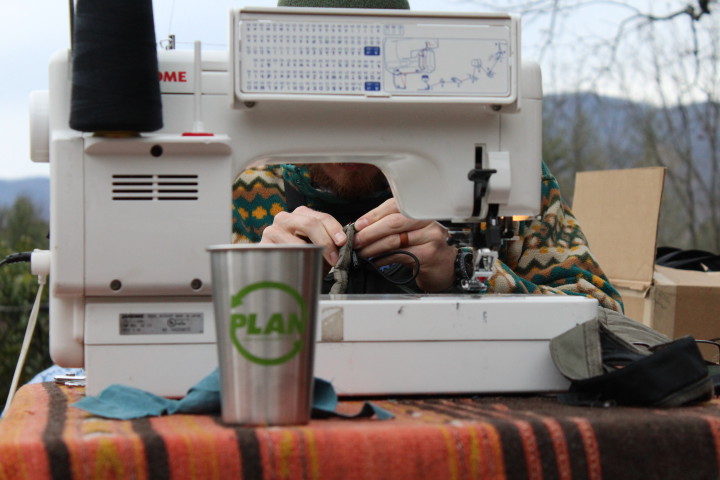
Inside a truck next to Stubbs’ sewing station, other tour workers repair clothes brought in by students and community members. Tables offer information about how to mend clothing and other ways to make it last longer. Inside Bryson Gym, more stations highlight other aspects of sustainability, such as instructions for things like fixing smartphone screens. Stations pulled together by student members of the school’s Sustainability Club feature work by local blacksmiths, fiber arts projects using wool from sheep on the college’s own farm and information about how to make dye out of food scraps.
“The vast amount of clothing that’s made today, and that’s not made to last, is a huge tax on the environment and landfills,” says Warren Wilson student Adam Grimes, an English major. “Mending your clothes is a big thing you can do.”
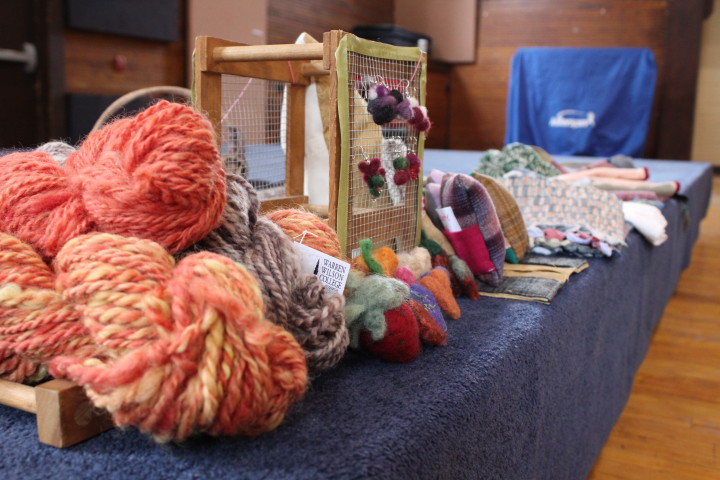
The Patagonia tour reflects a growing worldwide trend. According to a 2015 report by Global Industry Analysts Inc., a market research firm based in San Jose, Calif., U.S. sewing machine sales climbed from 228,181 units in 2013 to 248,678 two years later, and the global market is predicted to reach 30.8 million units by 2020. “Demand for home sewing machines is strongly influenced by cultural and social factors that encourage crafting, home decoration, mending and costume-making among women,” the report points out.
Stubbs, meanwhile, notes that folks of all ages are jumping on the bandwagon. “I think it fairly well bridges demographic gaps,” he says, needle and thread in hand. “Many, many people now are starting to see a need to repair their stuff instead of just replacing it through rampant consumerism.”
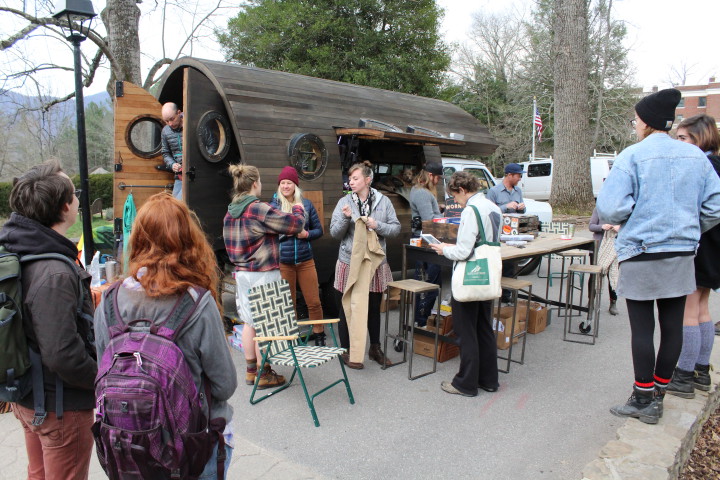
From doll clothes to prom dresses
For Linda Boyd, though, sewing isn’t just a hobby. She runs her monogramming and alterations business out of a little room at 70 Woodfin Place, just off Charlotte Street. Before opening the shop four years ago, she worked at the House of Fabrics on Merrimon Avenue, teaching and doing alterations.
Boyd credits Lucille Neilson, the store’s longtime former owner, with passing on her knowledge and techniques to her employees. Boyd says she was determined not to leave until her mentor did. But after Neilson retired and sold the business and a space became available at 70 Woodfin Place, Boyd decided it was time to start her own business.
“I came here really with no customers,” notes Boyd, perched beside her sewing machine. “The girls that were working at the store, they just picked up my customers, and I didn’t want to take that away from them. My husband was just having a stroke,” and he questioned the wisdom of the move. “But I said, ‘God’s opened that door for me: It’s going to be fine.’”
Eventually, some former clients did find her, but Boyd says 70 to 80 percent of her current customers are new ones. She sees a marked contrast between the self-sufficiency she learned growing up in a large family in Leicester and the tendency, “particularly in town, to hire everything done. I guess it wasn’t an option: There wasn’t money for it, so you learned to do it on your own.”
That included making your own clothing. “In a family of six,” says Boyd, “you didn’t have very much money, so if you wanted stuff, you made it. I cut down my aunt’s clothes when I was in high school and reworked them to where I’d have new clothes to wear to school.”
It was her grandmother, Boyd recalls, who first exposed her and her sister to sewing, giving them material to experiment with. “The first thing I remember doing is pulling the clothes off the dolls at Christmas and sitting and cutting. Our grandmother sewed, and she would pass the scraps to us, so we were making new clothes on Christmas Day for the dolls when we got them.”
These days, however, Boyd is shortening jacket sleeves, hemming prom dresses and embroidering monograms. She sees anywhere from 20 to 40 clients a week, and many of them bring in multiple items, including old clothing they want restored.
“With the price of food, gas, everything else going up — and rent in this area is ridiculous — that’s one place that people can cut corners. Even having alterations done on clothes from secondhand stores,” says Boyd, “is still cheaper than buying new clothing for full price.”
Creative alterations
Asheville is home to a number of sewing-and-alterations businesses, but most of them aren’t on wheels. Stina Andersen launched her own clothing line and label in 2007; over the next eight years, she set up shop in three different River Arts District locations.
In 2015, though, she decided it was time to stop relying on a landlord and moved ARTeries by Stina to a truck.
“It’s pretty awesome,” she says. “When people come on board they don’t know what to expect, but it makes them happy. It’s a very creative use of the space.”
Every Friday, her truck is parked at the Asheville Food Park on Amboy Road, showcasing clothing, jewelry and miscellaneous works of art. Andersen creates most of those offerings herself; the rest is by other local artists. Every piece of clothing she sells is unique, stresses Andersen, who also does general alterations.
“The customizations are pretty key to what I do,” she explains. “I’m a creative alterations specialist. I have the visionary ability to see how things will be better and how they can be upcycled.”
That’s a word that crops up a lot in Andersen’s vocabulary. Upcycling, she says, enhances an item, rather than turning it into something totally different.
And creativity aside, Andersen also tries to promote the idea that old clothing doesn’t have to be thrown away. Living in Mexico for three years, she continues, made her realize how consumeristic American culture is.
“The vision for my business is to help people realize that they don’t have to buy new — that they can buy upcycled, and the value’s not any less. I think the high caliber is part of what’s so cool about my clothing line and the work I do. It’s not like a thrift shop. You can get value and quality without having to feed into fast fashion and things that are disposable.”
Do-it-yourself fashion
Various local outposts, including the Asheville Cotton Co., House of Fabrics & Sewing Center and A-B Tech, offer classes in how to sew and mend clothing. There are also many online tutorials.
Andersen, meanwhile, has started a “stitch-and-bitch” every other Thursday evening in the Community Room at the Asheville Food Park. It’s a chance for people to come together and interact in a relaxed atmosphere. Participants say there’s less pressure than in formal classes, but they’re still learning sewing techniques.
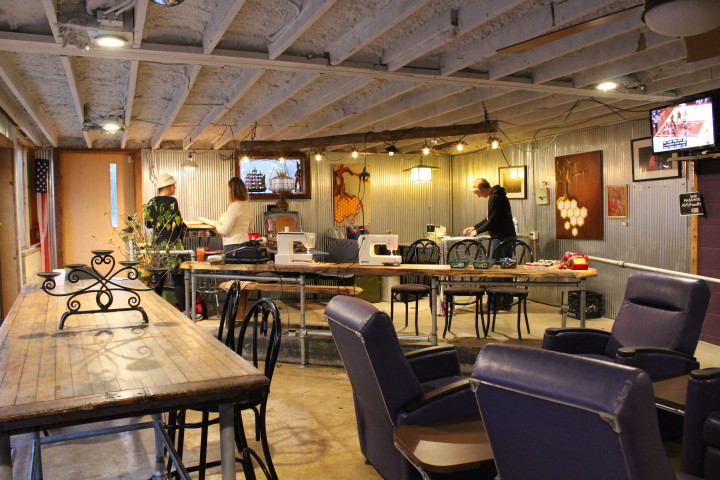
“It’s great because my creative juices get sucked out at work,” says Brandy Clements, who owns Silver River Chairs in the River Arts District. The stitch-and-bitch, she notes, offers relief from the stress of running a creative business. Her latest fashion trend is turning old T-shirts into skirts.
For Jessica Case, the biweekly gathering is a way to ensure that projects like the dress she’s currently working on hemming actually get done. Case says she’s sewn for a good part of her life, but much less since she became a registered nurse three years ago. Now, she’s dusting off her sewing machine. “It was buried in the basement. I felt so guilty!”
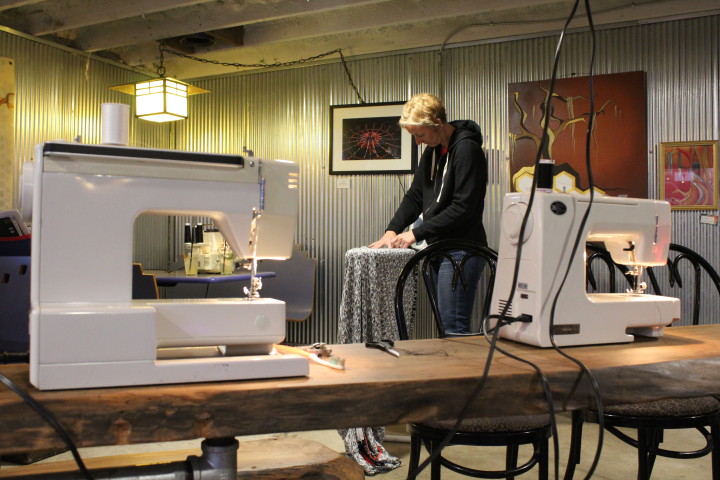


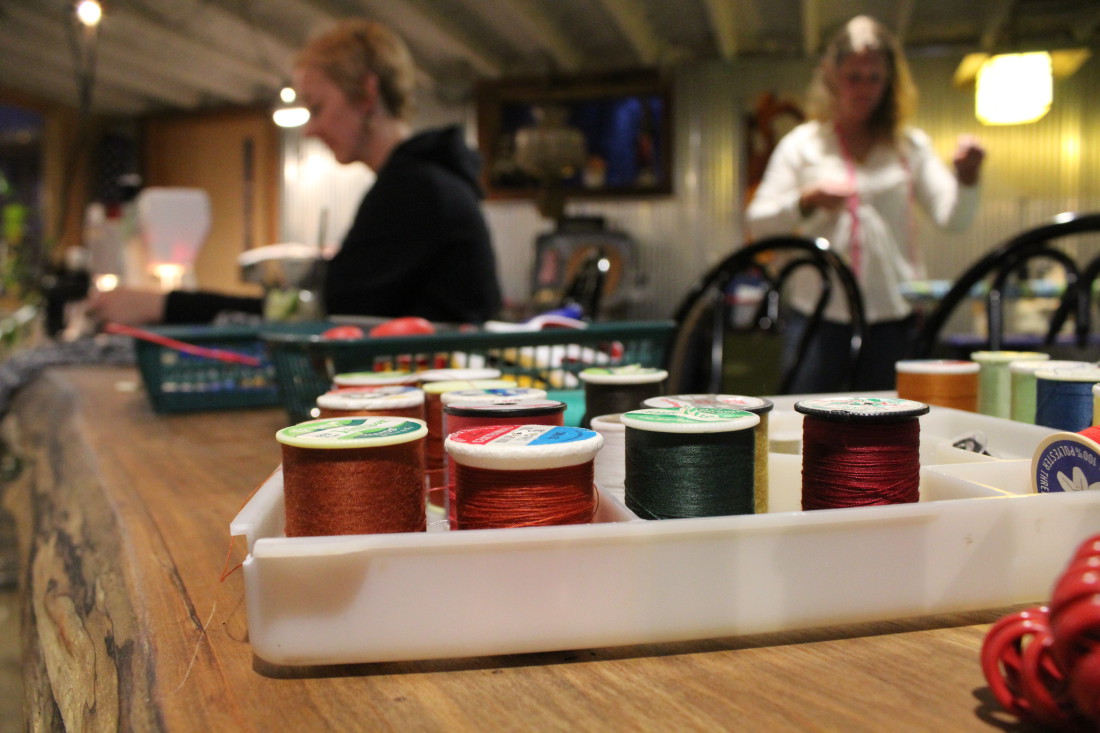
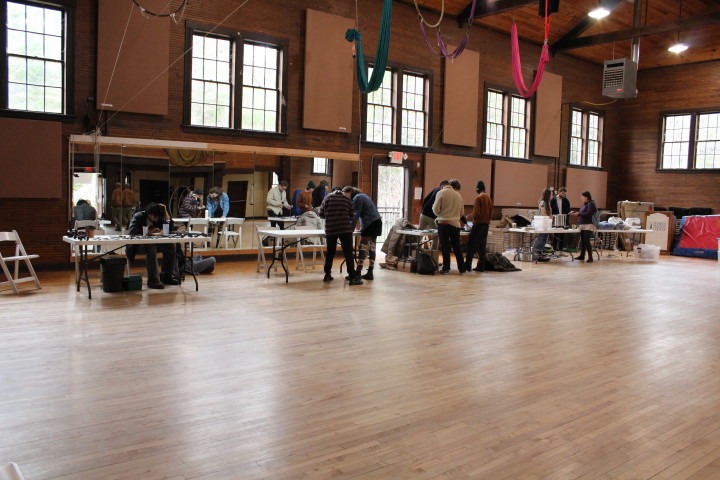
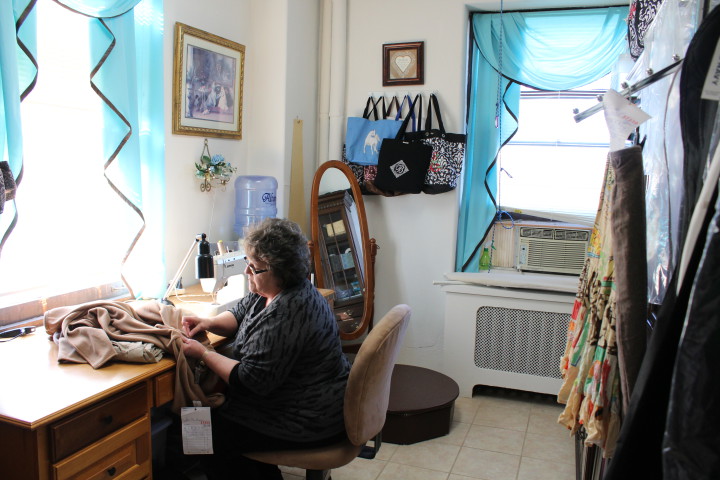
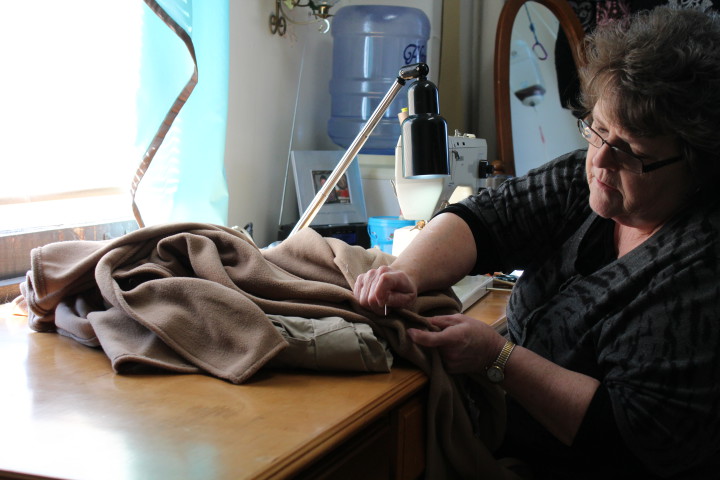
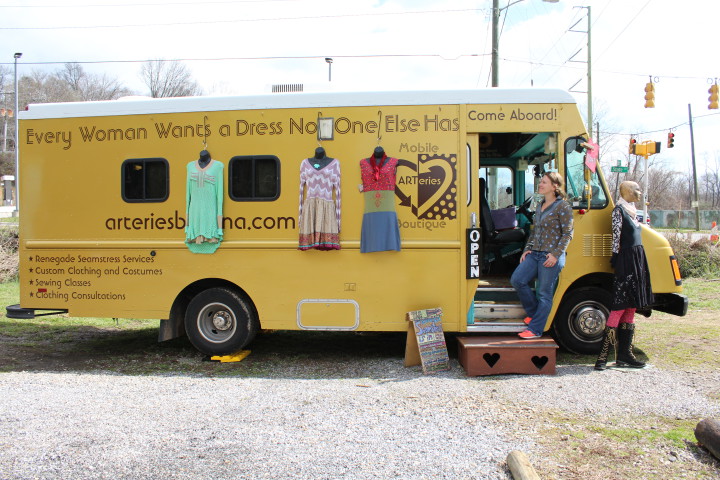
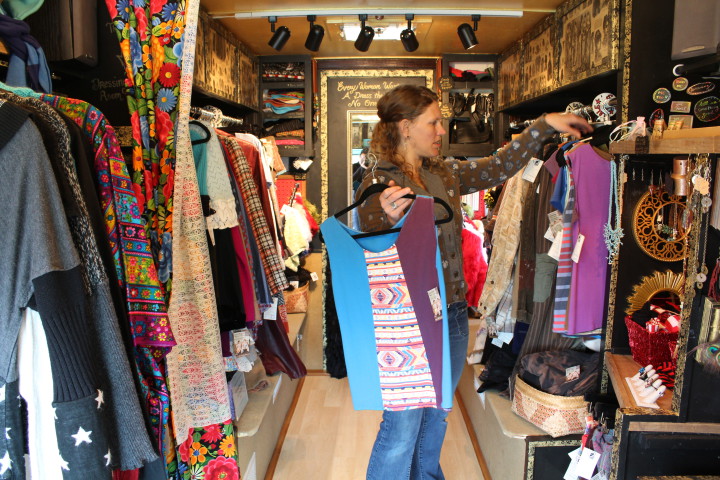
Nice to see people get involved.